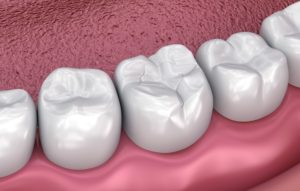 The biggest threat to your smile is tooth decay. Although it’s preventable, the Centers for Disease Control and Prevention reports 92% of adults have had a cavity in a permanent tooth. Furthermore, 1 in 4 adults has untreated cavities. Thankfully, decay doesn’t have to lead to the loss of a tooth. Your dentist can save your smile with a dental filling. Whether amalgam or composite, they are affordable and effective, but how long do dental fillings last? The answer depends on how well you care for them. Here’s how you can ensure your filling lasts for decades.
The biggest threat to your smile is tooth decay. Although it’s preventable, the Centers for Disease Control and Prevention reports 92% of adults have had a cavity in a permanent tooth. Furthermore, 1 in 4 adults has untreated cavities. Thankfully, decay doesn’t have to lead to the loss of a tooth. Your dentist can save your smile with a dental filling. Whether amalgam or composite, they are affordable and effective, but how long do dental fillings last? The answer depends on how well you care for them. Here’s how you can ensure your filling lasts for decades.
Lifespan of Dental Fillings
You have more options than ever when choosing a material for a dental filling. Although amalgam has been used for generations, many patients prefer tooth-colored fillings. The material you choose can influence how long the filling will last; however, the average lifespan is about 10 years. Various factors affect the longevity of the material, such as:
- Eating habits
- Oral hygiene habits
- Trauma to the tooth
- New decay
- Grinding and clenching teeth
Types of Fillings
Modern fillings are categorized as amalgam or composite, but there are four main types. Each has a different average duration:
- Amalgam: 17 years
- Composite: 7 years
- Ceramic: 15 years
- Glass Ionomer: 5 years
Protect Your Investment
You can ensure your filling serves you for many years before needing to be replaced by following a few tips:
- Home Oral Hygiene Routine: Brush your teeth at least twice daily using a soft-bristled toothbrush and nonabrasive toothpaste. Floss between each tooth before going to bed.
- Healthy Diet: Eat a healthy diet that’s limited in sugars and starches to prevent new decay.
- Visit Your Dentist: Maintain your semi-annual appointments for a cleaning and checkup.
- Protect Your Smile: Wear an athletic mouthguard if you play sports or a nightguard if you have bruxism to protect your filling.
Enjoy a Cavity-Free Smile
Rest assured; your filling will thrive for many years with the proper care. If you develop any signs it’s failing, don’t wait to contact your dentist to prevent secondary infections or the loss of your tooth. Symptoms can occur suddenly or gradually, such as:
- Difference in the contours of your teeth
- Increased tooth sensitivity
- Pain or discomfort when eating
- Toothache
- Bad breath or a bad taste in the mouth
- Floss shredding when flossing
- Color changes to the tooth
Your dentist will check your filling at each routine appointment to ensure it isn’t compromised. If they find any concerns, like fractures in the material, they can quickly replace the filling to ensure your tooth lasts for a lifetime. If you have any concerns in between your regular preventive visits, contact your dentist for an appointment.
About Dr. Rupeshwar Renkuntla
Dr. Renkuntla has over 20 years of experience in dentistry. He worked as a dental assistant before earning his dental degree in Oklahoma. Dr. Renkuntla focuses on prevention to create generations of healthy, beautiful smiles. If you need a preventive appointment or a filling replaced, contact our office today to schedule an appointment.
